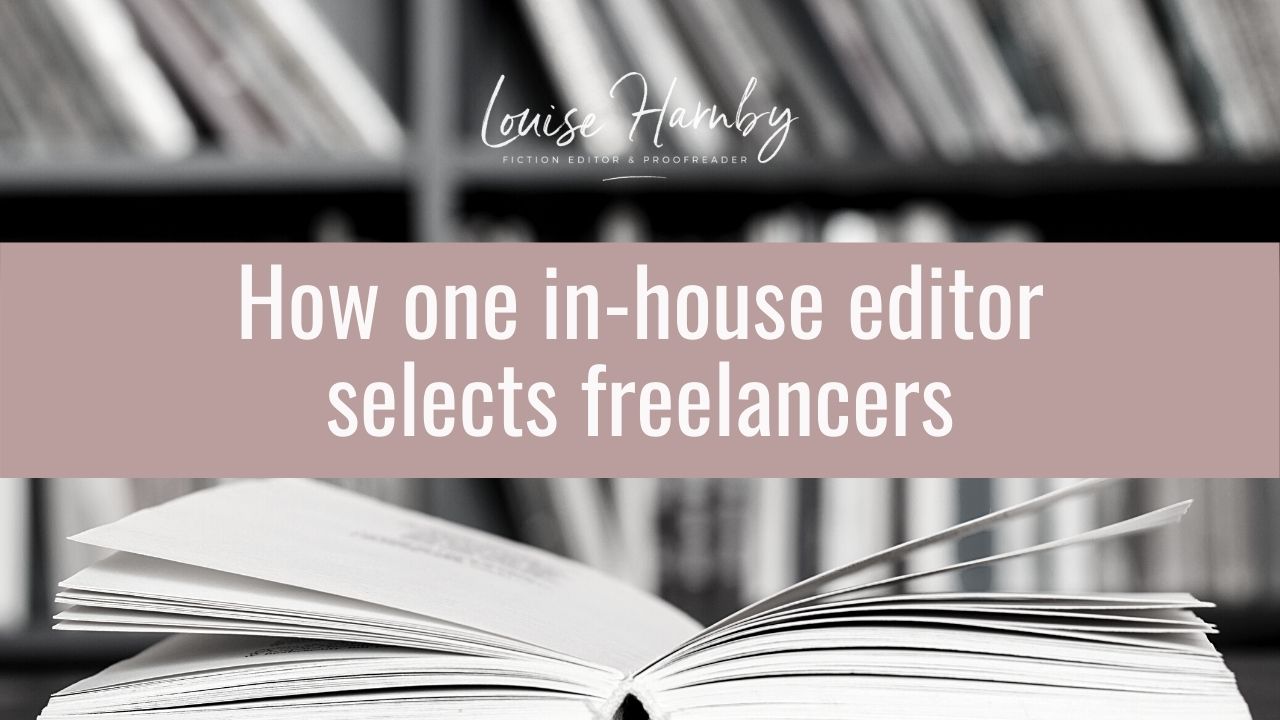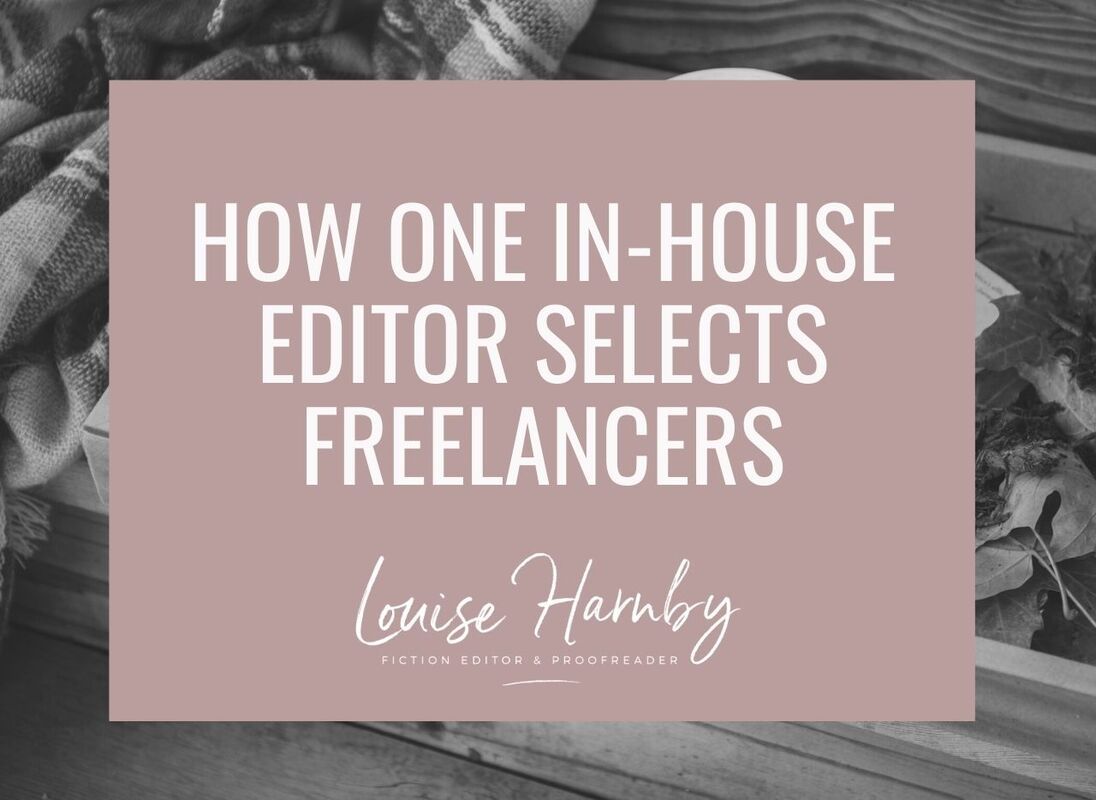|
An in-house editor sheds light on his experiences of in-house editorial production, including how freelance editors and proofreaders are selected.
This editor's contributions are from the point of view of a publishing professional, broadly speaking. So while some of the things he has to say are informed by his experiences within the UK company for which he works, his residency there is not in the capacity of a representative of that particular publishing house.
Louise: Hi, Philip. It’s great to have you here! First, can you tell us a little bit about yourself? It would be useful to have an overview of your daily responsibilities – many of our readers haven’t worked in-house so they may be unaware of what an in-house editor does. I understand that different presses work in different ways, but it would still be handy to know what you do.
UE: Hi Louise. It’s equally great to be contributing to your blog. So, a little bit about myself. I started working in publishing straight out of University back in 2010. I studied English and German at the University of Reading – and since my passion is language, publishing seemed like a natural career choice. I have been working in the editorial department of an academic publishing house for the past five years. It’s absolutely incredible how quickly time flies. You are completely right – every publishing house operates in slightly different ways, so I can’t say the experience is representative of the role of in-house editors up and down the country. And, even after five years, I am still rather new to the industry, compared with some of my colleagues, so I don’t speak as the one true voice of experience either. So, about my role … As an editor, I am responsible for the project management of up to fifteen social science/humanities titles at any given time. My ultimate responsibility is ensuring the standards of the final product are in keeping with company and author expectations. One thing that makes my role unique is that I, as an in-house editor, am responsible for typesetting my own projects. It is absolutely fantastic to feel so involved with a project from day one to the nerve-wracking day the book is ready to be sent to print. There is nothing better than having a satisfied author! Louise: Which editorial services do you currently contract out to freelancers? Structural/development editing, copy-editing, proofreading, indexing? Anything else? UE: We have three routes to print:
Louise: Today, I’d specifically like to focus on the commissioning of new freelancers. One question that comes up a lot in the freelance editorial community is: How does one get noticed by publishers? So do you use particular directories when you’re looking to source new suppliers, and if so which ones? Or do you consider freelancers who’ve contacted you direct (by email, telephone, letter)? How about referrals from colleagues working for other presses? UE: In collaboration with my line manager, I am responsible for curating the freelancer pool and enhancing freelancer processes, so I feel I can answer this question definitively. The best way to get noticed by a publishing house is simply by finding out who the relevant in-house contact responsible for the freelancer pool is, and then sending them a quick message to enquire about the process. If you don’t ever ask, you’re never going to know. Granted, a lot of publishers have established pools of people they use. However, I feel that you can never have too many freelancers in your pool – especially law proofreaders, who understand OSCOLA referencing. A CV and covering letter is a good base from which to start, but I’ve met freelancers in person to whom I have offered work. For example, I made new contacts off the back of attending the Society of Indexers (SI) conference in Cirencester in 2014, and many more at the joint Society for Editors and Proofreaders (SfEP)/SI conference in York in 2015. As an in-house editor, I would offer the following two key pieces of advice to any editorial freelancer:
Louise: When you read a CV and covering letter, or view someone’s listing in a membership directory, what are the key stand-out points that you're looking for? Here, I’m thinking about the skills, experience, training, and other qualifications that make you think, “Yes, that person’s someone we want in our freelance bank.” When I announced the launch of this column, two of my colleagues asked specific questions that relate directly to these issues. Just as a reminder I’ve included them here:
UE: It is a combination of different factors that determines whether a particular person is suitable for our freelancer pool. Since we have a quite full freelancer list, freelancer specialities tend to be significant. A good freelancer should be able to work on a variety of different material, but it is always good having somebody who really understands the text. Law, for example, tends to be one of those lists with a lot of subject-specific terms, and it is always good when these are understood in context. Having professional accreditation is desirable. For example, with indexing we look for membership of the SI, and with proofreading we look to the SfEP. Louise: How important is prior publishing experience, broadly speaking? If a freelancer has worked in-house, is this a strong selling point for you? Even if they haven’t worked in-house, is it important that they’ve worked for other publishers? I’m interested in your views on this because I’m often asked by new entrants to the field whether a lack of publishing experience means it will be more difficult for them to secure work with publishers. UE: In general, prior experience is important to in-house editors. If I see that a freelancer has worked for a particular client with similar lists to ours, then I will assume some level of familiarity with the subject matter. Professional accreditation is great, but experience is what can bring these qualifications to life. I understand that this is often one of the hardest things for new freelancers. They want to gain experience, but in order to do so they have to be given work. And to be given work, they need experience. You see where the problem is! I do therefore respect the fact that everyone has to start somewhere. You can often get a feeling from initial exchanges with freelancers whether your work together is going to be fruitful – call it editor’s intuition. Since all publishing houses work in different ways, it generally takes a couple of projects to get freelancers up to speed with working processes, but, by and large, the results are very pleasing. Louise: Finally, do you have any further advice you’d like to share with freelancers who want to acquire work with publishers? UE: Great question – I would say the following are points to bear in mind for anyone looking to acquire work:
Louise Harnby is a line editor, copyeditor and proofreader who specializes in working with crime, mystery, suspense and thriller writers.
She is an Advanced Professional Member of the Chartered Institute of Editing and Proofreading (CIEP), a member of ACES, a Partner Member of The Alliance of Independent Authors (ALLi), and co-hosts The Editing Podcast. Visit her business website at Louise Harnby | Fiction Editor & Proofreader, say hello on Twitter at @LouiseHarnby, connect via Facebook and LinkedIn, and check out her books and courses.
14 Comments
Maia
12/3/2015 12:18:45 am
Great article, thanks :)
Reply
The Undercover Editor
12/3/2015 04:44:21 am
Thanks, I'm glad you enjoyed it! :
Reply
12/3/2015 01:14:25 am
Very interesting interview. One thing I would like to see clarified is this: What are the expectations for a proofreader versus a copyeditor? I ask because Philip stated: "(2) Then there are projects that need proofreading by a freelancer. I would say this accounts for about 60% of our projects. (3) Then, once in a blue moon, a project comes along that needs copy-editing or substantive rewriting, and we contract the work to a freelancer with suitable skills." His answer implies that some of what a proofreader is expected to do is what, in the United States, would be a copyeditor's job.
Reply
Louise Harnby
12/3/2015 02:45:18 am
Hi Rich.
Reply
Undercover Editor
12/3/2015 04:58:30 am
That is most interesting, Louise. No, all of our work is carried out on-screen. In-house, "proofreading" could indeed be thought of as a light edit, and "copyediting" as substantive editing. The question about the US/UK divide is very interesting. When US authors publish are they expecting their text to be "proofread", i.e. sent to a proofreader, or to simply be given editorial attention?
Philip
12/3/2015 04:54:29 am
Hi Richard,
Reply
12/3/2015 04:09:21 am
This post is really helpful! It's helped me to see some weaknesses in my approach to asking publishers for work.
Reply
Louise Harnby
12/3/2015 05:34:48 am
Thanks for clarifying, Philip. I think the position Rich and I are coming from is a traditional one - so checking proofs in this sense means working on typeset page proofs. This is what my proofreading work for publishers usually entails. I do all the grammar, punctuation, spelling and consistency checks, reference checking, minor rephrasing if necessary, but I'm also looking beyond the words and checking the layout too - so things like (but not limited to) short lines, bad word breaks, recto word breaks, widows, orphans, correct running heads, and so on. And I do work onscreen for some of these publisher clients - here, I'm annotating PDFs (so the process is a digital version of annotating paper proofs). In this situation, I'm not amending the raw text; I'm just annotating. A typesetter will then implement my suggestions (after the in-house editor has checked them) and a set of second proofs will be issued, which will again be checked by the in-house editor.
Reply
12/3/2015 07:38:58 am
Thanks, Philip, for the clarification.
Reply
Tom Ekpo
11/7/2018 02:29:10 pm
Wow!
Reply
Claire Hammond
20/3/2020 11:48:15 am
Hi Louise. This interview was very useful to me. Thankyou so much.
Reply
Louise Harnby
21/3/2020 04:16:55 pm
You're very welcome, Claire!
Reply
Janet Field
4/1/2023 06:06:48 pm
An interesting read - some helpful tips
Reply
Leave a Reply. |
BLOG ALERTSIf you'd like me to email you when a new blog post is available, sign up for blog alerts!
TESTIMONIALSDare Rogers'Louise uses her expertise to hone a story until it's razor sharp, while still allowing the author’s voice to remain dominant.'Jeff Carson'I wholeheartedly recommend her services ... Just don’t hire her when I need her.'J B Turner'Sincere thanks for a beautiful and elegant piece of work. First class.'Ayshe Gemedzhy'What makes her stand out and shine is her ability to immerse herself in your story.'Salt Publishing'A million thanks – your mark-up is perfect, as always.'CATEGORIES
All
ARCHIVES
July 2024
|
|
|
|

















 RSS Feed
RSS Feed





